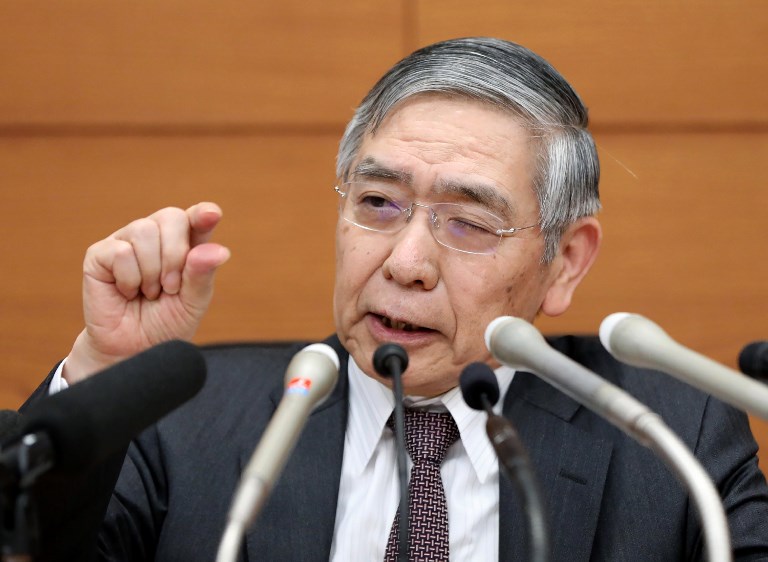English-Français
អន្តរជាតិ

Bank of Japan governor Haruhiko Kuroda speaks during a press conference in Tokyo on December 20, 2018
×![]()
ដោយ: AFP
Tokyo, Japan | Japan's central bank again revised down its inflation forecasts on Wednesday, a further sign that authorities are losing the battle to boost prices in the world's third-largest economy.
After a two-day meeting, the Bank of Japan's policy board left its mammoth monetary easing programme in place, as expected, and lowered the inflation forecast for the fiscal year ending March next year to 0.9 percent from 1.4 percent.
BoJ Governor Haruhiko Kuroda said the decision to revise down the forecast was "due primarily to the decline in crude oil prices", but added it would only be temporary.
"It is true that it will take some time for us to achieve the two-percent target," he told reporters, referring to the bank's long-held goal.
"It is our belief that the most appropriate way is to patiently continue the existing monetary easing."
The downward revision follows a previous downgrade in late October.
In 2013, the BoJ embarked on a huge bond-buying programme in a bid to stimulate long-dormant prices with the stated aim of hitting the two-percent mark within two years.
But while the plan -- which ran in tandem with Prime Minister Shinzo Abe's big-spending drive to ramp up the economy -- showed early promise, the bank has been forced to delay several times the date for hitting its target.
It has in the past blamed the "deflation mindset" of consumers and employers used to long periods of low growth and falling prices.
While the bank said Japan's economy will likely continue to expand, it added that "the mindset and behaviour based on the assumption that wages and prices will not increase easily have been deeply entrenched".
Officials have pointed to other factors, including cautious wage and price growth from firms, and increased technological progress that has reduced costs and intensified competition.
"It has been taking time to resolve these factors that have been delaying price rises," the bank said.
- Yen weakens -
The tepid inflation rate has meant the BoJ has had to maintain its easy money policy, even as other central banks begin to tighten.
However, the safe haven status of the yen and growing global economic uncertainty have helped the Japanese currency hold its strength against the greenback. On Wednesday, it was slightly down at 109.65 per dollar compared with 109.37 Tuesday.
However, in the longer-term, firms will shift toward raising wages and prices and the country's inflation rate "is likely to increase gradually toward two percent", it insisted.
The bank also slightly lowered the inflation forecast for the current fiscal year ending March 2019 to 0.8 percent from 0.9 percent, and reduced the projection for the year ending March 2021 to 1.4 percent from 1.5 percent.
Those figures do not factor in the effects of a consumption tax hike expected to go into effect in October.
The BoJ also adjusted forecasts for year-on-year economic growth.
For the fiscal year 2019, it revised up its growth projection to 0.9 percent from 0.8 percent, and for the year after, it now expects growth of 1.0 percent from 0.8 percent.
The bank pointed to an array of downside risks for Japan's growth including "US macroeconomic policies and their impact on global financial markets", protectionism and Brexit.
Kuroda said he expected the tax hike would have a limited impact on the overall economy, as the government is preparing broad measures to safeguard the fragile growth.
kh-hih/ric/qan
© Agence France-Presse
© រក្សាសិទ្ធិដោយ thmeythmey.com






















